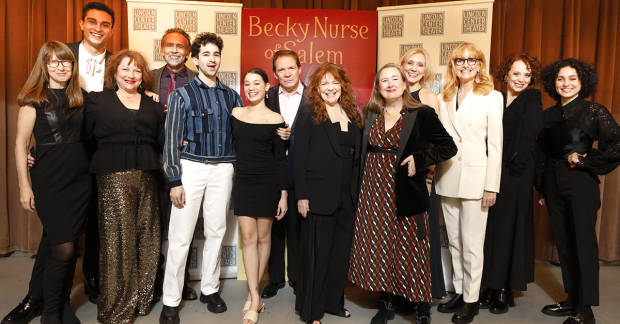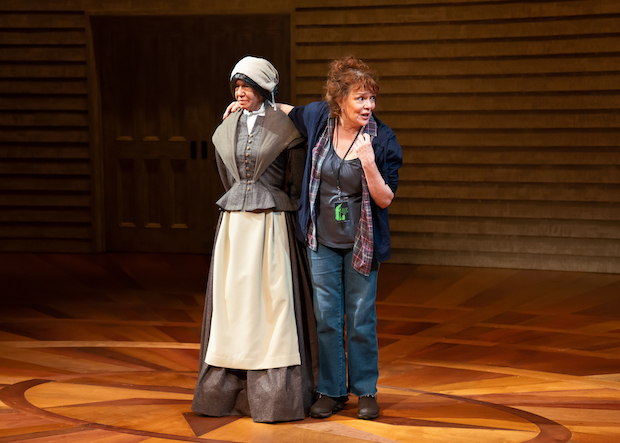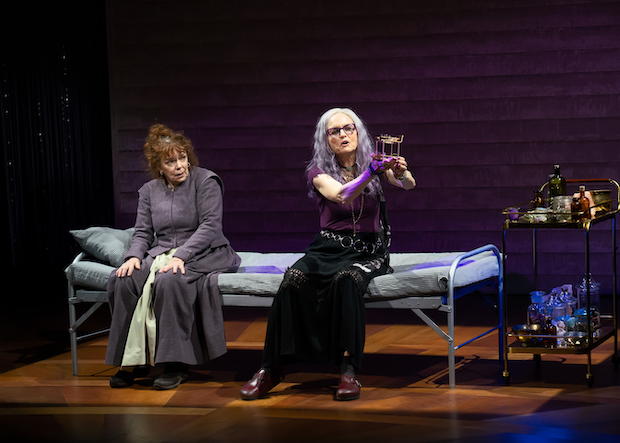Interview: Sarah Ruhl Talks About the Magic (and the Misogyny) That Inspired Becky Nurse of Salem
Ruhl’s new play is running at Lincoln Center Theater’s Mitzi E. Newhouse Theater.
Arthur Miller's The Crucible and the election of Donald Trump were seeds that sowed Sarah Ruhl's latest play, Becky Nurse of Salem, currently being staged off-Broadway at Lincoln Center Theater. The title character, played by Tony winner Deirdre O'Connell, is a descendant of Rebecca Nurse, a historical figure — and character in The Crucible — who was 71 when she was executed in 1692 during the Salem witch trials.
In Ruhl's play, Rebecca is also an imposing wax figure at the Salem Witch Museum, where Becky works as a tour guide until she's fired and her life takes a downward spiral. The sole caregiver to her teenage granddaughter after her daughter's death from opioids, Becky soon becomes addicted to them as well and, without many options, gives a witch large sums to solve her problems.
Ruhl, a Pulitzer finalist for In the Next Room, or the vibrator play and The Clean House, recalls being upset to learn that Miller's depiction of Abigail Williams in The Crucible was largely fictionalized, portraying her as a jealous teen who accuses John and Elizabeth Proctor of witchcraft because she'd had an affair with John. In reality, she was only 11 and had never met him. "I thought I needed to write some kind of response," says the playwright, whose works wittily and compassionately explore the female experience. "But once Becky Nurse the character started talking to me, it just became the story of this woman's journey."
The misogyny she saw during the 2016 presidential campaign also became part of the play, and after Becky Nurse premiered at Berkeley Rep in 2019, Lincoln Center Theater, which has been an artistic home for Ruhl since 2006, had it slated for 2020, until the Covid shutdown. On a rainy Wednesday afternoon, Ruhl was at the theater as the matinee was about to start when she discussed her latest work, the inspiration behind it, and her long-standing artistic relationship with Lincoln Center Theater.

(© Chasi Annexy)
This conversation has been condensed and edited for clarity.
Becky Nurse feels more issue-oriented than your previous plays. How much did what's going on in the world impact it?
I couldn't help but be impacted by the Trump years. Hearing large crowds chanting "Lock her up!" was so upsetting. That culture of misogyny in the present moment, then thinking back to the witch trials and the history of misogyny in this country, had me riled up. When I decided to set the play in Salem, Massachusetts, I also felt I couldn't ignore the opioid epidemic that was going on. [So I was] thinking about two kinds of epidemics: the so-called hysteria that led to the witch trials as being a kind of social poisoning, then the opioid epidemic as a kind of structural epidemic.
What influence did your director, Rebecca Taichman, have on the play?
Rebecca's wonderful dramaturgically, and she's also such a visual director. The first act has so many locations — Becky moves almost like a pilgrim's progress from one place to the next. Rebecca figured out how to make this really seamless and fluid.
When the audience enters the theater they're confronted with an imposing wax figure of the 17th century Rebecca Nurse on the stage. Was that your idea?
No, that was Rebecca's and the designers'. The Salem museum has all of these waxworks — some are from the '50s — in these dioramas. That was part of the thinking. Then the amazing team at Lincoln Center Theater labored to make her feel real and give her a sense of personality, or aura.

(© Kyle Froman)
It isn't just Becky's gender but also her lack of economic stability that makes her vulnerable. How significant was that to the story you wanted to tell?
It's somewhere in the stew. I felt when Becky lost her job that there was very little for her. I looked at the classifieds while I was writing and saw what jobs were available in Salem, and the two jobs were an overnight clerk at the Marriott and a Heaven's Maid garden vendor. It was in some ways just an organic process of revealing more layers of this character. I also found that there were these lost generations between grandparents and grandchildren where grandparents were often raising grandchildren because of the decimated generation from opioid-use disorder.
How fast was the writing process?
The first act I wrote fairly quickly, which is sometimes how I do it. I was at this beautiful place in Seattle, Hedgebrook, a women's writers retreat. There were birds flying by; I even saw a huge raven cawing. I have three kids and it was the first time I'd gone to a writers retreat since having kids. Then I often wait a while between writing the first and second act to let things marinate.
Is this your first time working with Deirdre O'Connell?
Yes! And I've loved her forever and known her in Les Waters's work and Annie Baker's work. She is magic. She is really a vessel for the greater good.
Do you believe in witchcraft or any kind of mystical abilities?
Definitely. I think the theater is a cauldron of that kind of magic and mystery — even if you're just talking about Stanislavski and setting your intention as a kind of mystical force. You have to believe in a bit of it to be in this profession.
You made your New York debut as a playwright 16 years ago at Lincoln Center Theater with The Clean House, and since then they've produced your work on Broadway and off. What is it that keeps you coming back to them?
It's such a beautiful home here. André [Bishop, LCT's producing artistic director] has believed in my work since the beginning and made such an enormous impact on my life. He's such a good, decent, kind, steady influence, and I love the people who work at the theater. It's enormously hard to make a play in an endemic, so coming back to Lincoln Center Theater to have my first play in New York in five years actually is very meaningful to me.

(© Kyle Froman)









